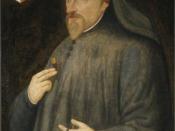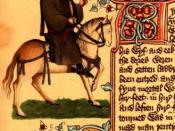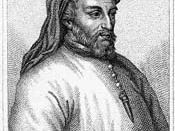Chaucer's Use of Irony in The Canterbury Tales In The Canterbury Tales, Geoffrey Chaucer compiles a mixture of stories on a pilgrimage into a figurative depiction of the medieval society in which he lived. Chaucer's stories have a punch and pizzazz, which, to an average reader, seem uncommon to the typical medieval writer, making his story more delightful. Certain things account for this pizzazz, especially the author's use of irony. Many of Chaucer's characters are ironic in the sense that they are so far from what one would expect in the roles they depict, and also the fact that they are larger than life. Every character has his distinct personality with his own behavioral traits. Chaucer also uses irony in his humor, with its unexpectedness and randomness.
The wife of Bath is a prime example of one of Chaucer's characters who is larger than life. She obviously is not what one would expect of a relatively wealthy woman in her time.
Her notorious traits such as not only having five husbands, but also marrying a majority of them for wealth and money stick in the mind with their ironic abnormality and appalling connotations: "ÃÂJohnny and Dame Alice And I myself, in the fields we went My husband was in London all that Lent; All the more fun for me""I only mean The fun of seeing people and being seen By cocky lads; for how was I to know Where or what graces Fortune might bestow'. (273) Chaucer accents her irregular character in this excerpt by portraying her promiscuous actions and her lack of virtue. The wife of Bath also shows irony in her actions by her need for control over others, especially her husbands. " "ÃÂSo help me God, I have to laugh outright / Remembering how I made...


